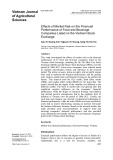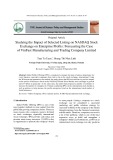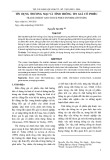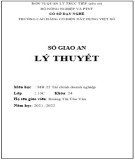
50
Journal of Economic and Banking Studies
No.8, Vol.4 (2), December 2024 pp. 50-65
©
Banking Academy of Vietnam
ISSN 2734 - 9853
The impact of geopolitical risk on the stock market and
stock bubbles in Vietnam: A mediation model
Le, Phuong Lan1 - Pham, Duy Thai2 - Vu, Van Duc3 - Nguyen, Manh Ha4
- Tran, Thi Minh Tram5 - Nguyen, Thi Mai Hoa6
Faculty of Banking and Finance-Foreign Trade University, Vietnam
Corresponding Authors.
E-mail address: lan.lp@ftu.edu.vn (Le, P. L.), thaipham041003@gmail.com (Pham, D. T.), duc.vuvan@ftu.edu.vn
(Vu, V. D.), nguyenmanhha@ftu.edu.vn (Nguyen, M. H.), tramttm@ftu.edu.vn (Tran, T. M. T.), hoantm@ftu.edu.
vn (Nguyen, T. M. H.)
Acknowledgement: This research is funded by Foreign Trade University (in Vietnam) under research
programme number FRURP02-2023-02
Chronicle Abstract
Article history This paper aims to examine the indirect impact of geopolitical risk on the
Vietnamese stock market and stock bubbles (VSB) through its impact on
macro factors and commodity prices. Firstly, before testing the influence of
geopolitical risk on stock bubbles, a stock bubble existence test using SADF
(sup augmented Dickey-Fuller test) and GSADF (generalized sup Augment-
ed Dickey-Fuller) is done. The tests show that stock bubbles appeared on
the Vietnamese stock market in 3 periods: September 2014 to November
2014, June 2017 to May 2018 and March 2021 to March 2022. Secondly,
the test on indirect relationship between geopolitical risk and Vietnam’s
stock market and stock bubbles reveals that geopolitical risk has a signifi-
cant indirect relationship with the stock market through intermediary fac-
tors including macroeconomic factors and natural gas prices, while it has a
significant indirect relationship with stock bubbles through the mediation
role of oil prices and natural gas prices. More specifically, the indirect re-
lationships are weak but positive, which means that increasing geopolitical
tension may cause the VNIndex (representing Vietnam’s stock market) to
increase and may further exacerbate stock bubbles on the market. Finally,
the indirect correlation between geopolitical risk and Vietnam’s stock bub-
ble is discussed and a crucial finding is concluded that major geopolitical
events often occurred just before and during the stock bubble formation.
Received
Revised
Accepted
12th Jul 2024
16th Oct 2024
28th Nov 2024
Keywords
Geopolitical risk,
Stock market,
Stock bubbles
DOI:
10.59276/JEBS.2024.12.2684
1. Introduction
Geopolitical events and geopolitical risks
are the focus of research on many sci-
entific topics in many fields, including
economics and finance. Caldara and Iacoviello
(2022) identified geopolitical risk (GPR) as the
threats, realisation and escalation of events re-
lated to war, terrorism and any tensions between
nation-states that affect peace in international
relations. To measure GPR, they have compiled
a geopolitical risk index that quantifies things
that seem difficult to measure. The GPR index
is calculated monthly by dividing the number
of articles that mention escalating geopolitical
tensions, or geopolitics in general, by the total
number of articles written that month. That way,
the GPR index is generated based on an auto-
matic search algorithm on the archives of 10
international newspapers. The historical GPR

Le, Phuong Lan - Pham, Duy Thai - Vu, Van Duc - Nguyen, Manh Ha
- Tran, Thi Minh Tram - Nguyen, Thi Mai Hoa
51
No.8, Vol.4 (2), December 2024 - Journal of Economic and Banking Studies
dates back to 1900 and the more recent GPR
index goes back to 1985.
The impacts of geopolitical risks on all aspects
of our lives are immense. In addition to the
obvious effects on the lives and properties of
the unfortunate people located in the countries
directly affected, geopolitical events and risks
also affect the economic factors of many other
countries. Recently, the war in Ukraine has
shown the strong influence of geopolitical risks
on the world’s economy. Acre et al. (2023)
pointed out that the war caused a great shock
to the global economy, especially to the energy
and food markets, by tightening supply and
pushing prices to unprecedented levels.
As an important part of every economy, the
stock market can also be influenced by geopo-
litical factors. Hoque and Zaidi (2020) demon-
strated that GPR can impact the stock market
in both positive and negative ways depending
on lag time, volatility mode, and market stock.
GPR is proven to have a two-way effect on the
stock market.
In this paper, the influence of geopolitical risks
on Vietnam’s stock bubble is also examined.
Previous studies have shown that despite being
established for only 23 years, the Vietnamese
stock market has witnessed waves of bubble
formation and bursting. Reza (2010) explains
that price bubble is often used to describe a situ-
ation in which the market is constantly in a state
of overvaluing assets relative to their intrinsic
value. Jones (2014) states that an asset price
bubble can form as the market continues to ap-
preciate an asset despite of a prior appreciation.
When trading, investors believe that since the
value of an asset has increased previously, the
price will increase further in a short period of
time. Therefore, the investor decides to buy the
asset at a higher price than before. The further
rise in price then exacerbates the bubble and
increases the risk of a bubble burst along with
the risk of a market crash when the asset’s price
returns to its pre-bubble level.
To test the presence of bubbles on the Viet-
namese stock market in the period from 2006
to 2019, numerous research has applied the
statistical right-side stationarity test (SADF) and
the general right-side stationarity test (GSDAF).
Chau and Tran (2020) showed the presence of
VSB in the periods of 2006-2012 and 2013-
2019. More specifically, Vietnam’s stock
market appeared to have a stock bubble during
3 periods: from the end of 2006 to May 2007,
from January 2007 to March 2007, and from
June 2017 to May 2018. In addition, the Viet-
namese stock market has recently witnessed the
formation of a stock bubble from the beginning
of 2021 to the second half of 2022. It is worth
noting that in most of the periods when VSB oc-
cur, the GPR index is also in higher-than-normal
levels. During the stock bubble of 2017-2018,
the GPR index had several periods of highs
(above 100). Two major geopolitical events: the
U.S.-China Trade War and the geopolitical crisis
on the Korean Peninsula took place during that
period. In the most recent stock bubble (2020-
2022), the GPR index also increased dramati-
cally, especially in the late 2021 and early 2022
periods. The GPR index’s fluctuations coincided
with the escalating tensions between Russia and
Ukraine at the end of 2021, culminating in the
official outbreak of conflict between the two
countries in February 2022. Through that cor-
relation, the relationship between geopolitical
risks and stock bubbles deserves a closer look.
In the context of current geopolitical uncertain-
ties around the world, studies into the impacts of
geopolitical risk on asset markets are increasing-
ly needed and have great practicalities. There-
fore, this study adds into and helps contribute to
further research this rapidly developing field of
study. The scope of this paper is the impact of
geopolitics on the Vietnamese stock market and
VSB. Since Vietnam is situated in an important
geostrategic crossroad between world powers
and is therefore affected by major geopoliti-
cal events, the country is an ideal location to
examine this relationship. Furthermore, through
research into the Vietnamese stock market, this
paper also aims to contribute to the research
archives about the influence of geopolitics on
the Vietnamese stock market, since previous
research on this topic is scarce. Moreover, the
paper is also intended to help investors, indi-
viduals or organisations anticipate the influence

The impact of geopolitical risk on the stock market and stock bubbles in Vietnam:
A mediation model
52
Journal of Economic and Banking Studies- No.8, Vol.4 (2), December 2024
of regional and international geopolitics on
the Vietnamese stock market to derive suitable
investment strategies.
This paper examines the indirect effects of
geopolitical risk on the stock market and
stock bubbles through the mediation impact of
macroeconomic factors and commodity prices.
Mediation occurs when the effect of the inde-
pendent variable A on the outcome variable C
occurs through the intermediate variable B. In
this case, the geopolitical risk factor plays the
role of an independent variable, acting through
the intermediate variables that are macroeco-
nomic factors such as inflation, FDI inflow, and
other macro factors to influence the dependent
variable, which is the stock bubble in Vietnam.
In addition to the above factors, oil and natural
gas prices are also added to the intermediate
variables due to the strong impact of these vari-
ables on the stock market. The macroeconomic
factors used in this study are intentional due to:
First, their influence on the Vietnamese stock
markets; Second, their susceptibility to geopolit-
ical events; Third, the availability of their data.
2. Literature review and research hypotheses
The impact of geopolitical risk on the economy
in general, and asset and stock prices in par-
ticular, has attracted much research. This part
of the article summarises and analyses prior
research on two areas: (1) Research on the im-
pact of macro factors on asset prices and asset
bubbles, (2) Research on the impact of GPR on
intermediate factors, and studies on the impact
of GPR on the stock market, especially the
Vietnamese stock market.
2.1. Research on the impact of macroeconom-
ic factors on asset prices and asset bubbles
Many studies showed the impact of macro
factors on asset prices in general, and the stock
market in particular. Hussainey and Le (2009)
showed that the industrial production index had a
positive impact on the Vietnamese stock market.
However, short-term interest rates and long-term
interest rates were demonstrated to have oppo-
site effects on the stock market. More specifi-
cally, short-term interest rates had a negative
effect on the market and long-term interest rates
had a positive effect. Regarding the impact of
monetary policy on the stock market, Vo (2018)
proved that monetary policy had a correlation
with the movements of the stock market. How-
ever, this relationship did not have a big impact
on Vietnam’s stock market in the studied time
frame.
Moreover, the effects of geopolitical risk on as-
set prices and on the formation of asset bubbles
also received the attention of many studies. Su
et al. (2023) demonstrated that geopolitical fac-
tors as well as related natural factors increased
the likelihood of natural gas bubbles forming
in Europe. Their research results showed that
out of ten observed natural gas bubbles, five
were formed under the influence of geopolitical
factors. In which, the war between Russia and
Ukraine was the factor that led to the formation
of the latest natural gas bubble from March to
April 2022. More specifically, the sanctions and
embargoes of Western countries on Russian gas
exports caused natural gas prices to climb to
record levels. Umar et al. (2022) showed that
natural gas has provided a significant abnor-
mal return since February 24, 2022. Thereby,
the price of natural gas was proven to depend
directly on GPR. In addition, the influence of
GPR on precious metal prices was also exam-
ined. According to Baur and Smales (2020), in
the weeks following the 2001 terrorist attacks
in the U.S., the price of gold futures contracts
increased by 6.2%. They showed that the return
of precious metals was positively related to
changes in geopolitical risks. Thereby, precious
metals, more specifically gold were considered
to be a safe haven against those risks.
Le et al. (2020) examined the impact of mon-
etary policy on the real estate bubble in Hanoi,
Vietnam. Their results showed that real estate
bubbles reacted quickly to shocks from mon-
etary policies and demonstrated that monetary
policy was not only the cause of the real estate
bubbles, but also the solution to them. Le
(2014) proved that real estate bubbles in Ho Chi
Minh City, Vietnam depended on shocks from

Le, Phuong Lan - Pham, Duy Thai - Vu, Van Duc - Nguyen, Manh Ha
- Tran, Thi Minh Tram - Nguyen, Thi Mai Hoa
53
No.8, Vol.4 (2), December 2024 - Journal of Economic and Banking Studies
economic growth variables, real estate credit
balance and foreign investment in real estate.
Le et al. (2019) showed that, in the long term,
the VNI stock price index was affected by the
oil price, money supply, interest rate, SJC gold
price, and exchange rate. In the short term, the
stock price index had a causal relationship with
oil prices, interest rates, and the M2 money
supply. The results were supported with further
research (Dao et al., 2022; Pham & Ngo, 2019).
Furthermore, research by Su et al. (2017) also
demonstrated that foreign direct investment
(FDI) had a significant impact on the VN Index.
Thus, we argued that macroeconomic variables
had a significant impact on asset prices in gen-
eral, and on the stock market indices (including
the VN Index) in particular.
From the above literature review, the following
hypotheses are proposed:
H1: Macroeconomics variables (namely in-
flation rate, FDI inflow, Industrial production
index) have positive impact on VN Index.
H2: Oil and natural gas prices have positive
impact on Vietnam’s stock market and VSB.
2.2. Research on the impact of GPR on inter-
mediate factors
Khan et al. (2020) pointed out that oil prices
were affected by risks, geopolitical uncer-
tainties, and GPR influences oil prices in the
medium term. Using wavelet analysis for the
period of 1985-2016, Li et al. (2020) investi-
gated the time and frequency change co-mo-
tion and the causal relationship between crude
oil price and GPR. A strong level of co-synergy
between GPR and oil prices was detected at
very high frequency (for short duration) over
the whole sampling period. However, such
correlation was not seen at low frequency (for
long duration) almost during the sampling
period. Li et al. (2020) examined the correla-
tion between GPR and crude oil prices based
on data from June 1987 to February 2020. By
using the time-varying copula method, the
relation between GPR and oil price was shown
to be strong during political tension. Further-
more, the correlation between GPR and crude
oil prices fluctuated strongly during periods
of political stress. Furthermore, Abbel-Latif
et al. (2020) showed that a positive shock to
geopolitical risk resulted in higher oil prices.
They also found that the low oil prices per-
petual cycle (e.g. the late 1980s one) resulted
in a geopolitical fight (the 1st Iraq War),
which later, in turn, led to higher oil prices.
Further research by Noguera-Santaella (2016),
Minesso et al. (2024), Wang et al. (2023) all
demonstrated that geopolitical risks had some
discernible impacts on oil prices.
By applying the SUR (seemingly unrelated
regression) estimation model, Nguyen et al.
(2022) pointed out the negative influence of
GPR on FDI inflows. In addition, Kim et al.
(2019) argued that investors were discouraged
from investing in developing countries when
the regional GPR increased, as asymmetric
information during uncertain times created a
disadvantage for foreign investors (compared
to domestic) in the region. Nguyen and Lee
(2021) showed that countries with ambiguous
economic policies received lower FDI. They
also pointed out the safe-haven effect, in which
foreign investors moved FDI from risky places
to perceived safer locations. Bilgin et al. (2020)
made an interesting observation that GPR
caused government spending to increase, miti-
gating consequences of geopolitical risks.
Regarding the effect of GPR on inflation,
Caldara et al. (2023) argued through the struc-
tural autoregression (SVAR) model that high
GPR caused inflation to increase. An escala-
tion of geopolitical tensions was demonstrated
to have the same negative effect as a supply
shock. With a one-standard deviation shock to
GPR, inflation increased by about 2 percentage
points. In addition, high inflation and declining
economic activity were usually accompanied by
expansionary fiscal policies. Looking at the im-
pact of geopolitical events on the United States,
they found that the impact of GPR shocks cor-
responds to that of expenditure shocks. More
specifically, a spike in geopolitical risk raised
inflation by a little more than 1 percentage
point and caused GDP levels to rise at nearly 2
percents above trend before starting to fall. They

The impact of geopolitical risk on the stock market and stock bubbles in Vietnam:
A mediation model
54
Journal of Economic and Banking Studies- No.8, Vol.4 (2), December 2024
also showed that high GPR was accompanied by
news about future increased in military spend-
ing, which could materialise within the next 3 to
5 years, leading to an increase in public debt.
Through the above research, GPR is shown to
directly affect macroeconomic variables, natu-
ral gas, and oil prices. The effects of GPR on
those variables are complex and vary through
different time periods. Thus, the following
hypotheses have been formulated:
H3: Geopolitical factors directly affect mac-
roeconomic variables.
H4: Geopolitical factors directly affect oil
and natural gas prices.
2.3. Research on the impact of GPR on the
stock market
Many studies have covered the effects of GPR
on the stock market. By examining the influence
of GPR on four emerging stock markets, Hoque
and Zaidi (2020) drew the conclusion that GPR
impacts each country differently. For the Indian
stock market, they showed that GPR had a posi-
tive effect on the Indian market returns at a low
level with moderate volatility and had a negative
effect in high volatility regimes. For the Indo-
nesian stock market, GPR was shown to have
a positive effect on the market in low volatility
mode, and a simultaneous negative effect with
moderate volatility. The effects suggested that
the relationship could be different over time,
depending on changes of market conditions
and structure. Bouri et al. (2023) examined the
impact of oil price volatility and GPR on Gulf
countries’ internal stock markets (GCC) under
different conditions. They demonstrated that
while the impact of oil price volatility on GCC
stock markets was larger than that of GPR, both
had a positive effect on the return and volatility
of the stock market under bullish cases. Specifi-
cally, oil price shocks led to increased returns in
GCC stock markets under bullish conditions, and
depressed returns when the market was going
down. Lee and Chen (2020) examined whether
U.S. and home country geopolitical risks (GPRs)
and disasters affected the rate of returns from
ETFs by applying a quantile regression method.
It was found that US disasters impact more than
home country disasters on ETF returns. Further-
more, U.S. and home country GPRs and disas-
ters also had influence on rate of returns. Zhang
et al. (2023) found that GPR had a significant
positive effect on stock market volatility, and
the effect of GPR on stock market volatility was
more significant for emerging economies, crude
oil exporters, and countries at peace. Feng et
al. (2023) pointed out that the impact of GPR
on market volatility increases when there were
large shocks to the markets such as war, financial
crisis and COVID-19. In addition, the impact of
GPR on the total volatility spillover index was
shown to be negative in the early and late time
periods, and positive in the middle periods. Pan
et al. (2023), concentrating on China’s stock
market, showed that global geopolitical risk
presents non-linear causality effects on both the
overall volatility connectedness among industry
sectors in the stock market and the net volatility
connectedness across different sectors. Based
on the findings above, GPR has shown to have
some impacts on stock markets around the
world, especially regions prone to geopolitical
events. Previous research also showed that GPR
had an indirect impact on stock markets through
mediation variables, such as oil price. Thus,
GPR has proven to have both direct impacts
and indirect impacts on stock markets through
mediation variables. Therefore, GPR also affects
the Vietnamese stock market to some extent. The
following research hypothesis is put forward:
H5: Geopolitics, through macroeconomic
variables and oil and gas prices, have an im-
pact on Vietnam’s stock market and VSB.
2.4. Research on the impact of geopolitical
factors on Vietnam’s stock market
Among the countries in the world, Vietnam’s
geographical location is quite unique. According
to Vuving (2023), Vietnam not only played the
role of a gateway to the sea for two neighbour-
ing countries: Laos and Cambodia but was also
an important link in the strategic playing field of
major powers such as China, the United States,
Japan, and India. Thus, Vietnam’s stock mar-



















![Câu hỏi ôn tập Tài chính tiền tệ: Tổng hợp [Mới nhất]](https://cdn.tailieu.vn/images/document/thumbnail/2025/20251230/phuongnguyen2005/135x160/49071768806381.jpg)



![Câu hỏi ôn tập Tài chính Tiền tệ: Tổng hợp [mới nhất/chuẩn nhất]](https://cdn.tailieu.vn/images/document/thumbnail/2025/20251015/khanhchi0906/135x160/49491768553584.jpg)


